‘Marital rape is practically legal here’: Women around the world explain why they’re marching
From America to Zambia, millions are set to protest over the ‘alarming rollback’ of rights across the globe, writes women’s correspondent Maya Oppenheim
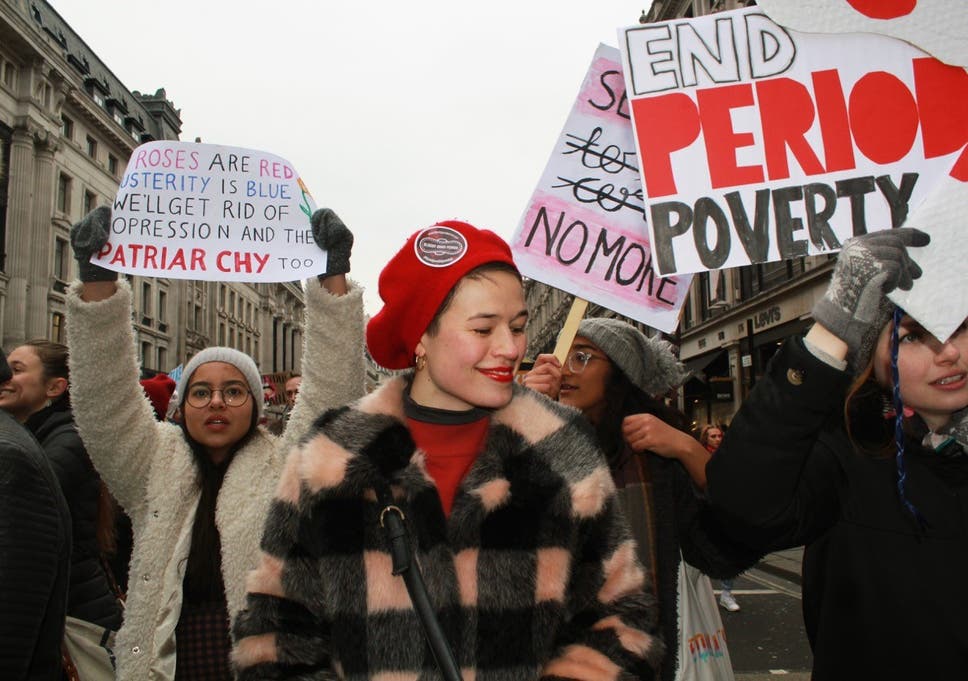
The event, which is the fourth Women’s March to take place
since the protests started in 2017, is centred around the
theme of 'bodily autonomy' ( Angela Christofilou/The Independent )
Armed with banners and megaphones, millions of women around the world will take to the streets on Saturday to protest against the “alarming rollback” of women’s rights and groundswell of anti-abortion policies amid the rise of the far right.
The inaugural Women’s March demonstration in 2017 saw six million people express their fury over the election of Donald Trump despite his record of demeaning, sexually aggressive comments about women.
Women’s March has been growing ever since – with 45 marches in cities and towns which cover 20 countries stretching across Central and South America, Europe, Africa, Asia, Canada and Australia planned for Saturday.
Uma Mishra-Newbery, executive director of Women’s March Global, said: “This past year, we have experienced a surge in the rollback of women’s human rights across the world. One of the most shocking developments was when the United States declared, along with 19 other member states, that there is no international right to abortion at a United Nations meeting. We are extremely concerned that this will lead to a collective retreat of women’s rights across the world.”
Women's march 2019 – global protest in pictures
Show all 30
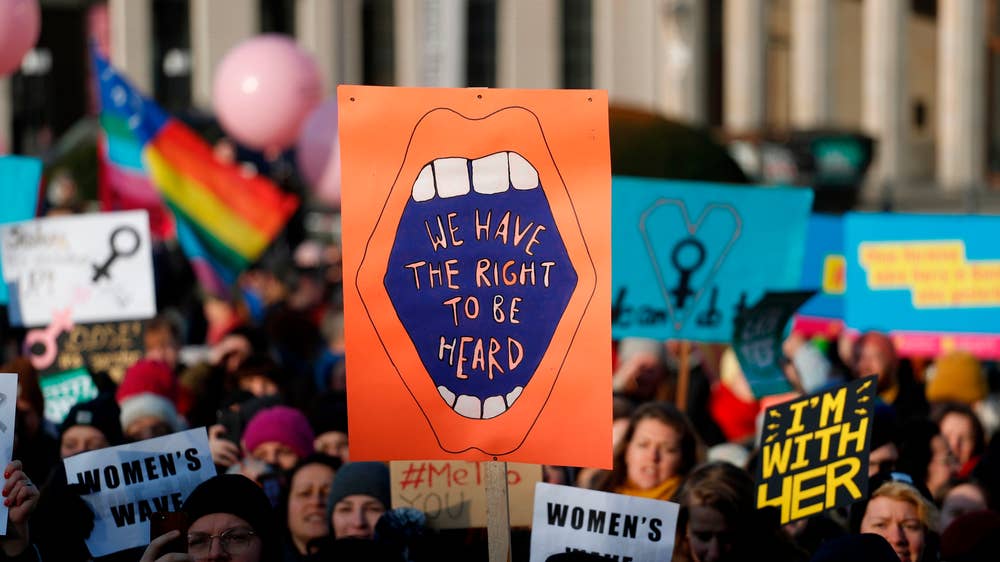
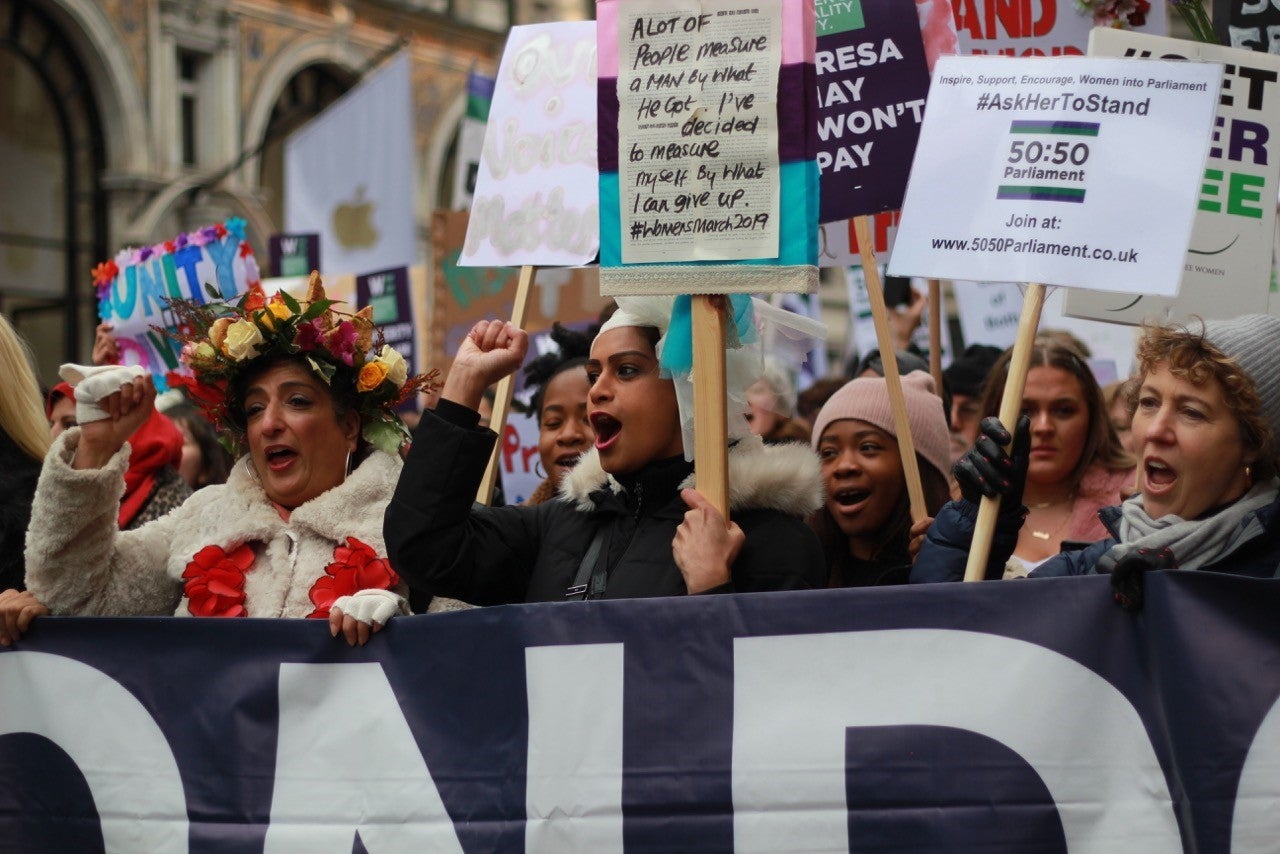
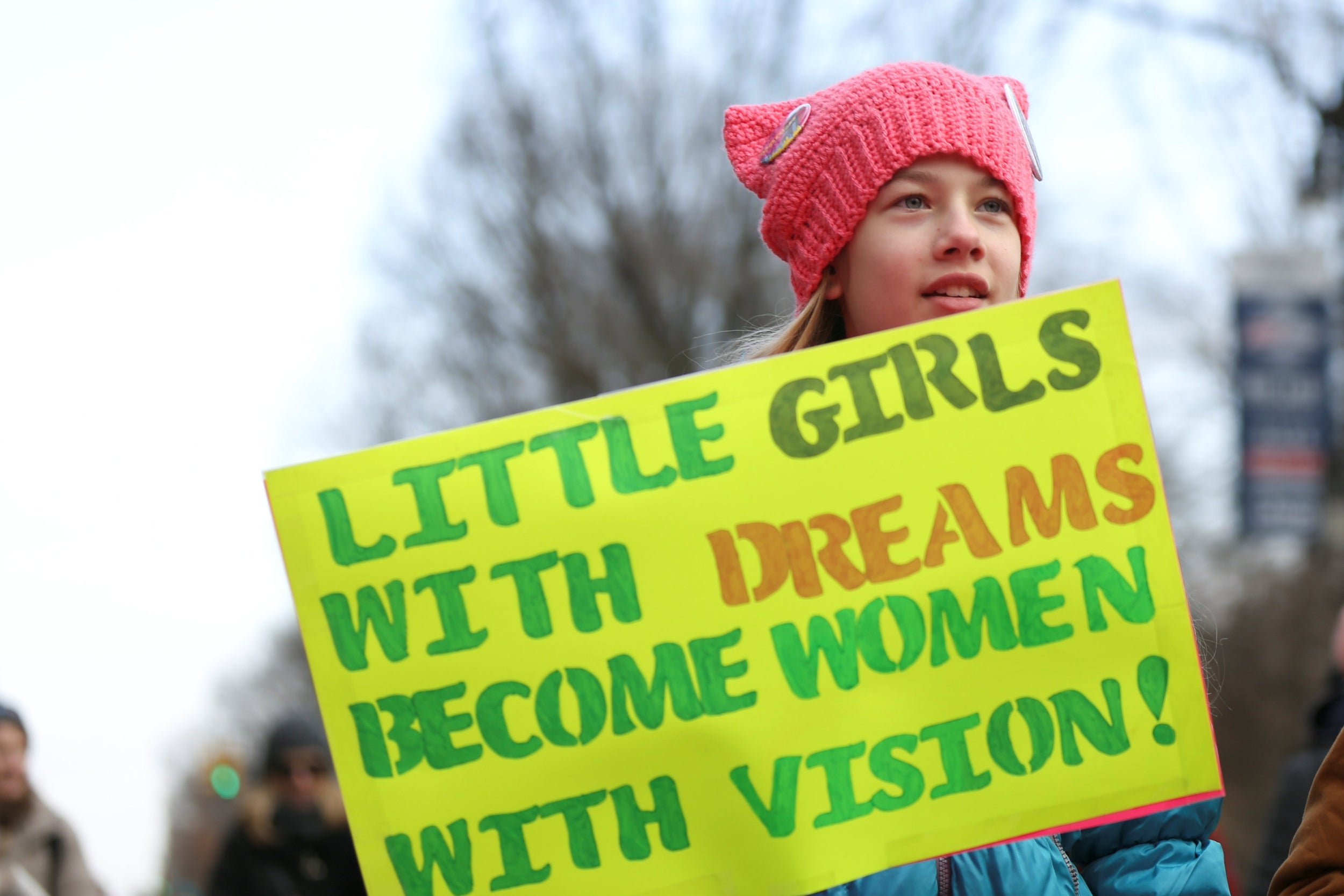
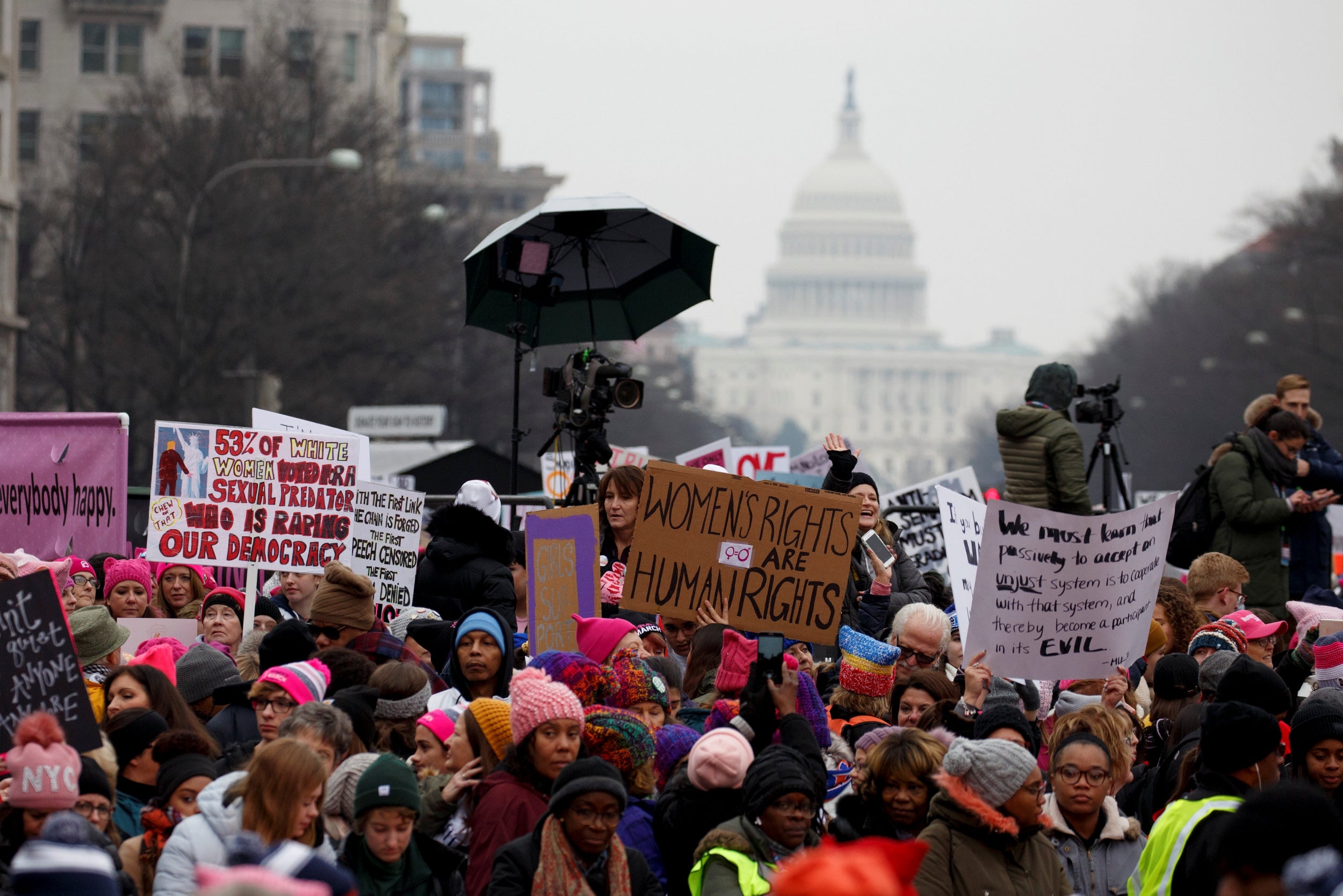
The Independent spoke to women around the world involved in organising this year’s marches about why they are taking to the streets.
Zambia: ‘Our country is a haven for rapists’
Ann Holland, who is organising the Women’s March in the Zambian capital of Lusaka, said gender-based violence was highly prevalent in the African nation and patriarchal views are deeply entrenched.
The campaigner said their protest would be “very loud” and “very feminist” and people from more than 50 organisations are attending. They had strived to make the march more inclusive this year in an attempt to build a movement which is a safe space for marginalised groups, Ms Holland added.
She said: “We are centring trans women, sex workers, refugee women and women living with disabilities. Our theme is Leave No Woman Behind and we want to make sure of that.

Women’s March activists in Zambia
“We are using our march to lobby for many laws like the end of taxed pads to help stop period poverty and we are petitioning for strict laws when it comes to sexual assault because our country is a haven for rapists.
“If you want to understand the kind of sexism and inequality Zambian women face, imagine a smaller South Africa, with a population of 17 million, with less media coverage and a country probably stuck in the fifties. Women and girls die every day here at the hands of men. We record thousands of cases of rape every four months. Women die from gender-based violence and marital rape is practically legal here.”
The best placards from the Women's March 2019
Show all 27
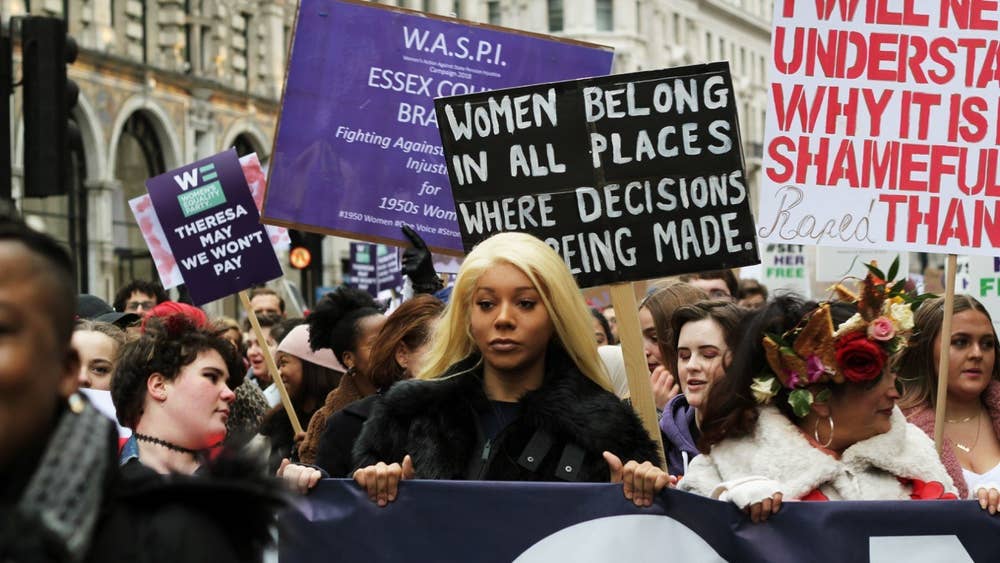
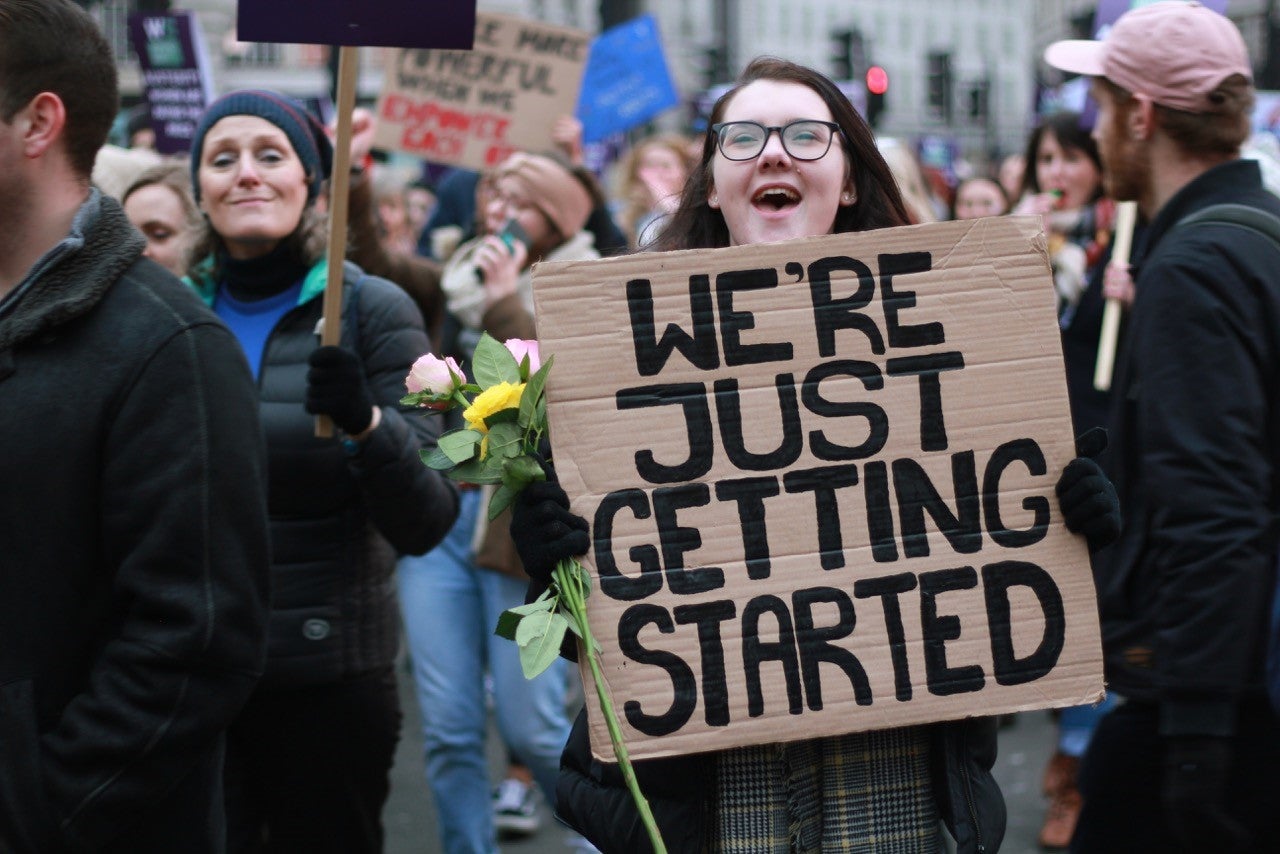
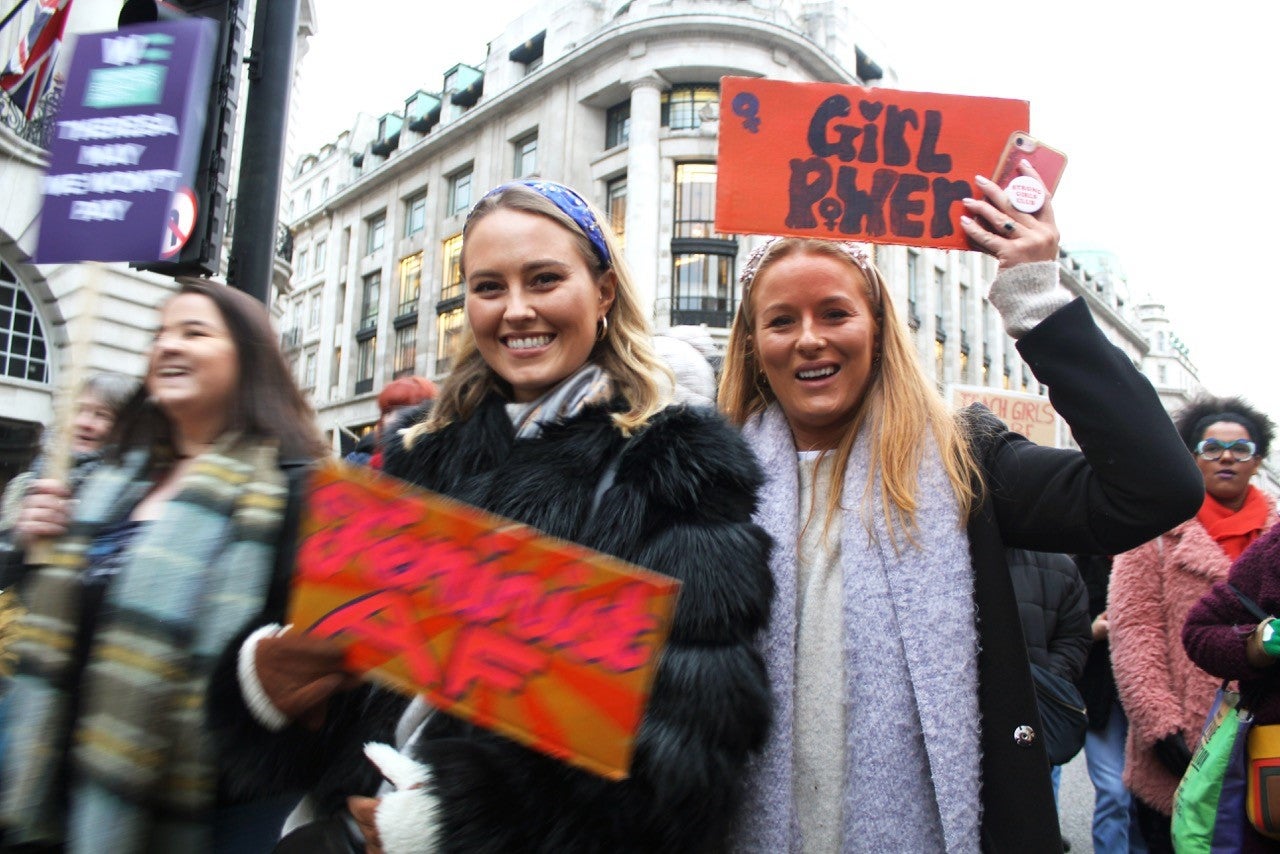
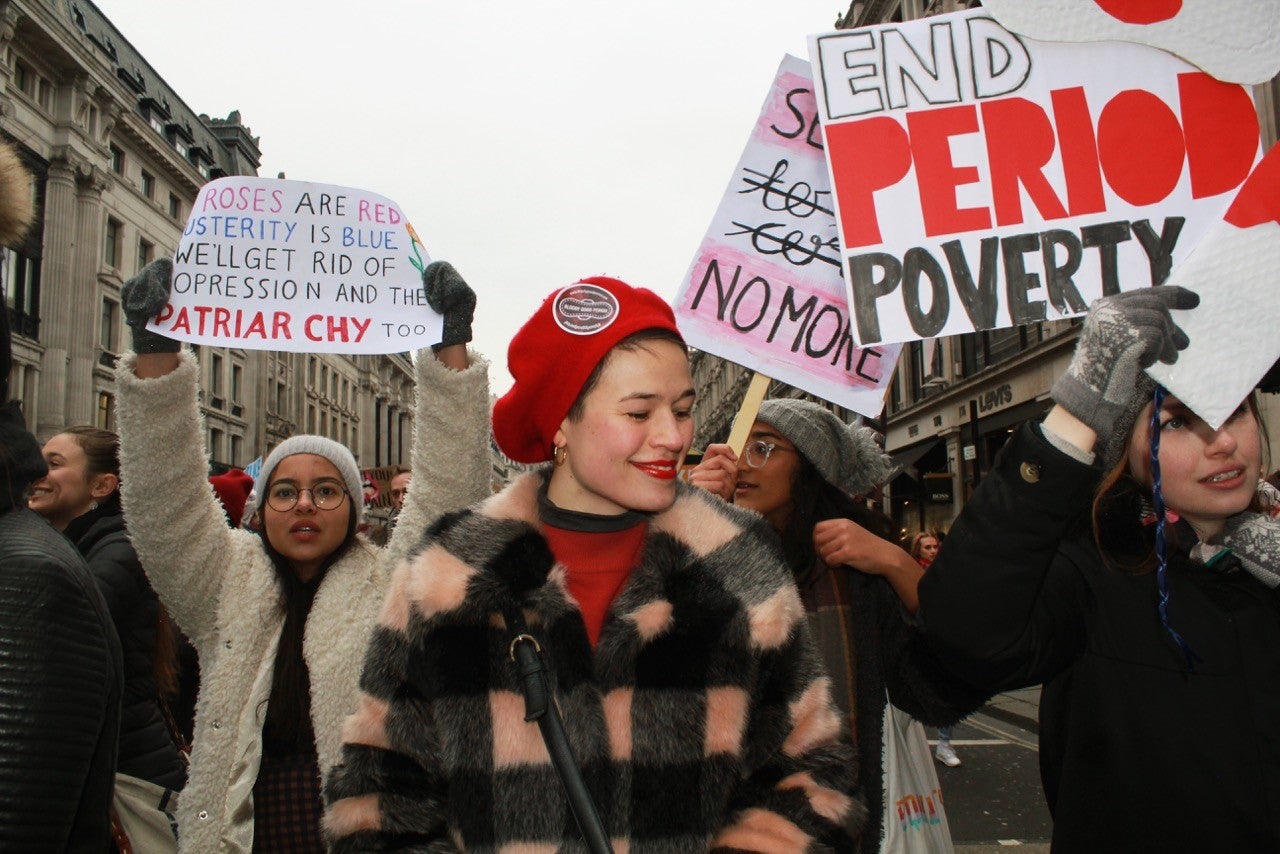
The campaigner said women’s rights in the nation were currently being utilised by many companies and organisations for “political propaganda”. Feminist movements are rising in the country but such activists are arguably “the most hated and misunderstood group”, she added.
“According to patriarchs we are too bitter, have a vendetta against men and are probably lesbians who just need men to cure them,” Ms Holland said. “The women hate it too. Feminism is bigger with the younger women aged between 15 to 30. They are more aware, they understand the need for feminism and to constantly work together to smash patriarchy.”
United Kingdom: ‘We are now facing at least another four and a half years of the same old’
Aisha Ali-Khan, co-organiser of Women’s March London, said there would be a big turnout because of the Conservative landslide in the December general election and anger at the Trump administration in the US.
Protesters are set to gather in Whitehall in Central London for a rally rather than a march calling for a “fairer, more equal and sustainable future”.
Ms Ali-Khan, who is a teacher, said: “We march for the rights of women, as well as women who don’t have a voice, and for the marginalised. We march against austerity measures and the fact the rich are getting richer and the poor are getting poorer. This is especially true with universal credit.
Armed with banners and megaphones, millions of women around the world will take to the streets on Saturday to protest against the “alarming rollback” of women’s rights and groundswell of anti-abortion policies amid the rise of the far right.
The inaugural Women’s March demonstration in 2017 saw six million people express their fury over the election of Donald Trump despite his record of demeaning, sexually aggressive comments about women.
Women’s March has been growing ever since – with 45 marches in cities and towns which cover 20 countries stretching across Central and South America, Europe, Africa, Asia, Canada and Australia planned for Saturday.
Uma Mishra-Newbery, executive director of Women’s March Global, said: “This past year, we have experienced a surge in the rollback of women’s human rights across the world. One of the most shocking developments was when the United States declared, along with 19 other member states, that there is no international right to abortion at a United Nations meeting. We are extremely concerned that this will lead to a collective retreat of women’s rights across the world.”
Women's march 2019 – global protest in pictures
Show all 30




The Independent spoke to women around the world involved in organising this year’s marches about why they are taking to the streets.
Zambia: ‘Our country is a haven for rapists’
Ann Holland, who is organising the Women’s March in the Zambian capital of Lusaka, said gender-based violence was highly prevalent in the African nation and patriarchal views are deeply entrenched.
The campaigner said their protest would be “very loud” and “very feminist” and people from more than 50 organisations are attending. They had strived to make the march more inclusive this year in an attempt to build a movement which is a safe space for marginalised groups, Ms Holland added.
She said: “We are centring trans women, sex workers, refugee women and women living with disabilities. Our theme is Leave No Woman Behind and we want to make sure of that.

Women’s March activists in Zambia
“We are using our march to lobby for many laws like the end of taxed pads to help stop period poverty and we are petitioning for strict laws when it comes to sexual assault because our country is a haven for rapists.
“If you want to understand the kind of sexism and inequality Zambian women face, imagine a smaller South Africa, with a population of 17 million, with less media coverage and a country probably stuck in the fifties. Women and girls die every day here at the hands of men. We record thousands of cases of rape every four months. Women die from gender-based violence and marital rape is practically legal here.”
The best placards from the Women's March 2019
Show all 27




The campaigner said women’s rights in the nation were currently being utilised by many companies and organisations for “political propaganda”. Feminist movements are rising in the country but such activists are arguably “the most hated and misunderstood group”, she added.
“According to patriarchs we are too bitter, have a vendetta against men and are probably lesbians who just need men to cure them,” Ms Holland said. “The women hate it too. Feminism is bigger with the younger women aged between 15 to 30. They are more aware, they understand the need for feminism and to constantly work together to smash patriarchy.”
United Kingdom: ‘We are now facing at least another four and a half years of the same old’
Aisha Ali-Khan, co-organiser of Women’s March London, said there would be a big turnout because of the Conservative landslide in the December general election and anger at the Trump administration in the US.
Protesters are set to gather in Whitehall in Central London for a rally rather than a march calling for a “fairer, more equal and sustainable future”.
Ms Ali-Khan, who is a teacher, said: “We march for the rights of women, as well as women who don’t have a voice, and for the marginalised. We march against austerity measures and the fact the rich are getting richer and the poor are getting poorer. This is especially true with universal credit.
How the far right is costing women their human rights
“We are now facing at least another four-and-a-half years of the same old. We will now have Brexit so women’s rights are more under threat. The domestic abuse bill has fallen the wayside and was pushed further and further down the political agenda.
“Every week, two women are murdered by a partner or ex-partner in the UK. Violence against women should be a priority for Priti Patel but it isn’t. We have seen a massive rise of men using rough sex as an excuse for killing their partners. We are seeing misogyny getting worse.”
Canada: ‘There is a lot of residual sexism’
Lila Palychuk, who is helping to organise the Women’s March in Sarnia in Ontario, said there were deeply ingrained sexist views in the town.
The campaigner added: “There is a lot of residual sexism and patriarchal views here. We had a municipal election recently and we elected one woman but she is not very progressive. If you look at the femicide report, there is a fair amount of female deaths at the hands of male domestic partners but we are no worse than anywhere else.
“But reports of sexual assaults have gone up steeply in Sarnia-Lamton [an electoral district in Ontario]. Sexual assaults doubled from 2017 to 2018. People are more empowered. Police are attributing it to the #MeToo movement.”
Ms Palychuk said it was “very exciting” connecting with other marches around the world last year due to being such a “small community”. Demonstrators from a range of ethnicities and sexualities and members of the indigenous community attended, the 31-year-old accountant added.
“Last year was our first march. There were 500 people last year in a huge amount of snow. There should be at least 500 again.”
Paris: ‘Sexism is a quintessential French trait’
Honorine Boudzoumou, spokesperson for Women’s March Paris, raised concerned about the high levels of violence against women in France where there has been mounting outrage over femicides, defined as the gender-motivated killing of women, in recent months.
The campaigner said that although the government has adopted measures to tackle such violence, the measures remain insufficient.
Honorine Boudzoumou marching in Paris
She added: “It feels like there is a lot of talk and very little action. For example, after the large governmental meeting on domestic violence, a number of new measures were announced, but the money allocated to them was insultingly low.
“Women face an enormous amount of violence in their daily lives, which is influenced by their socioeconomic class, race, and identity. Femicide is the most extreme form of this violence because it seeks to erase us completely. At some point, you begin to wonder if your life even matters. You wonder what you actually would have to do for the threats that you face to be taken seriously.”
France has witnessed a fierce backlash to the #MeToo movement against sexual harassment and assault.
Read more

“We are now facing at least another four-and-a-half years of the same old. We will now have Brexit so women’s rights are more under threat. The domestic abuse bill has fallen the wayside and was pushed further and further down the political agenda.
“Every week, two women are murdered by a partner or ex-partner in the UK. Violence against women should be a priority for Priti Patel but it isn’t. We have seen a massive rise of men using rough sex as an excuse for killing their partners. We are seeing misogyny getting worse.”
Canada: ‘There is a lot of residual sexism’
Lila Palychuk, who is helping to organise the Women’s March in Sarnia in Ontario, said there were deeply ingrained sexist views in the town.
The campaigner added: “There is a lot of residual sexism and patriarchal views here. We had a municipal election recently and we elected one woman but she is not very progressive. If you look at the femicide report, there is a fair amount of female deaths at the hands of male domestic partners but we are no worse than anywhere else.
“But reports of sexual assaults have gone up steeply in Sarnia-Lamton [an electoral district in Ontario]. Sexual assaults doubled from 2017 to 2018. People are more empowered. Police are attributing it to the #MeToo movement.”
Ms Palychuk said it was “very exciting” connecting with other marches around the world last year due to being such a “small community”. Demonstrators from a range of ethnicities and sexualities and members of the indigenous community attended, the 31-year-old accountant added.
“Last year was our first march. There were 500 people last year in a huge amount of snow. There should be at least 500 again.”
Paris: ‘Sexism is a quintessential French trait’
Honorine Boudzoumou, spokesperson for Women’s March Paris, raised concerned about the high levels of violence against women in France where there has been mounting outrage over femicides, defined as the gender-motivated killing of women, in recent months.
The campaigner said that although the government has adopted measures to tackle such violence, the measures remain insufficient.

Honorine Boudzoumou marching in Paris
She added: “It feels like there is a lot of talk and very little action. For example, after the large governmental meeting on domestic violence, a number of new measures were announced, but the money allocated to them was insultingly low.
“Women face an enormous amount of violence in their daily lives, which is influenced by their socioeconomic class, race, and identity. Femicide is the most extreme form of this violence because it seeks to erase us completely. At some point, you begin to wonder if your life even matters. You wonder what you actually would have to do for the threats that you face to be taken seriously.”
France has witnessed a fierce backlash to the #MeToo movement against sexual harassment and assault.
Read more

Inside El Salvador’s state-sponsored persecution of vulnerable women
Protesters are holding a round table in Paris instead of a march because organisers wanted a space for “in-depth discussions”.
Ms Boudzoumou said: “The theme of our event is bodily autonomy. However, in the debate over bodily autonomy in France, certain voices are almost completely ignored, like those of people of colour, Muslims, LGBT+ people, people with disabilities, fat people, and sex workers.”
The campaigner argued sexism is a “quintessential French trait” and called for people to understand this in order to be able to “dismantle it”.
“We did have the #BalanceTonPorc [Expose Your Pig] movement, which provoked major public discussions about sexism,” she added. “Women dared to speak up unabashedly, and the shame finally switched sides. That said, there is still a lot of work to do. Our country is way behind others in dealing with these problems.”
Switzerland: ‘Swiss banks are fuelling the climate crisis’
Activists in the Swiss capital of Geneva are raising awareness of the gendered dimension of climate change in this year’s march.
Doreen Akiyo Yomoah, one of the organisers, said: “We feel that as feminists in Switzerland, we have a responsibility to draw attention locally to the way that Swiss banks are fuelling the climate crisis, which affects the most vulnerable people in the world the most. Women are 14 times more likely than men to die from climate-change related natural disasters.
Women’s March protesters in Geneva
“People with intersecting identities, like people from the Global South, rural areas, disabled people, indigenous people and LGBT+ also all face heightened risk to their lives and livelihoods.
“Although on paper women may have the same rights as men, violence in the country is still a major problem. According to the federal government, once every two weeks, someone (usually a woman) dies from domestic violence. This may not sound very high compared to some other countries, but no one should ever be victim to domestic violence. And for a country with a small population, it is significant.”
The campaigner said women’s march activists from Geneva and Zurich had joined forces and they were expecting 500 women to attend.
Read more

Protesters are holding a round table in Paris instead of a march because organisers wanted a space for “in-depth discussions”.
Ms Boudzoumou said: “The theme of our event is bodily autonomy. However, in the debate over bodily autonomy in France, certain voices are almost completely ignored, like those of people of colour, Muslims, LGBT+ people, people with disabilities, fat people, and sex workers.”
The campaigner argued sexism is a “quintessential French trait” and called for people to understand this in order to be able to “dismantle it”.
“We did have the #BalanceTonPorc [Expose Your Pig] movement, which provoked major public discussions about sexism,” she added. “Women dared to speak up unabashedly, and the shame finally switched sides. That said, there is still a lot of work to do. Our country is way behind others in dealing with these problems.”
Switzerland: ‘Swiss banks are fuelling the climate crisis’
Activists in the Swiss capital of Geneva are raising awareness of the gendered dimension of climate change in this year’s march.
Doreen Akiyo Yomoah, one of the organisers, said: “We feel that as feminists in Switzerland, we have a responsibility to draw attention locally to the way that Swiss banks are fuelling the climate crisis, which affects the most vulnerable people in the world the most. Women are 14 times more likely than men to die from climate-change related natural disasters.

Women’s March protesters in Geneva
“People with intersecting identities, like people from the Global South, rural areas, disabled people, indigenous people and LGBT+ also all face heightened risk to their lives and livelihoods.
“Although on paper women may have the same rights as men, violence in the country is still a major problem. According to the federal government, once every two weeks, someone (usually a woman) dies from domestic violence. This may not sound very high compared to some other countries, but no one should ever be victim to domestic violence. And for a country with a small population, it is significant.”
The campaigner said women’s march activists from Geneva and Zurich had joined forces and they were expecting 500 women to attend.
Read more

Raped during the Kosovo war, a woman’s life 20 years on
A new feminist movement called the Greve des Femmes demonstrated across the country in June for pay equity, an end to gender-based violence and discrimination against female migrants and women of colour, Ms Akiyo Yomoah said.
Mallorca: ‘The society is historically patriarchal’
Lesley Harris, who is involved in the Women’s March chapter in Palma de Mallorca, argued the national government in Spain is not taking sufficient action to make the definition of rape clearer and more in line with other European countries.
Rape has to involve specific acts of violence such as being threatened with a knife or dealt physical blows under Spain’s criminal code.
Ms Harris said: “There are myriad concerns about the violence against women in Spain. The society is historically patriarchal but is willing to change. Sexist and patriarchal attitudes are entrenched, but the youth are digging them out.
“I work as a teacher, and now that these issues are included in the curriculum, students often stop and question ‘Is this sexist? Is this okay? Why or why not?’ With the speed that people organise a demonstration, the sharing of stories, sympathy or outrage spreads at the speed of a click.”
A new feminist movement called the Greve des Femmes demonstrated across the country in June for pay equity, an end to gender-based violence and discrimination against female migrants and women of colour, Ms Akiyo Yomoah said.
Mallorca: ‘The society is historically patriarchal’
Lesley Harris, who is involved in the Women’s March chapter in Palma de Mallorca, argued the national government in Spain is not taking sufficient action to make the definition of rape clearer and more in line with other European countries.
Rape has to involve specific acts of violence such as being threatened with a knife or dealt physical blows under Spain’s criminal code.
Ms Harris said: “There are myriad concerns about the violence against women in Spain. The society is historically patriarchal but is willing to change. Sexist and patriarchal attitudes are entrenched, but the youth are digging them out.
“I work as a teacher, and now that these issues are included in the curriculum, students often stop and question ‘Is this sexist? Is this okay? Why or why not?’ With the speed that people organise a demonstration, the sharing of stories, sympathy or outrage spreads at the speed of a click.”
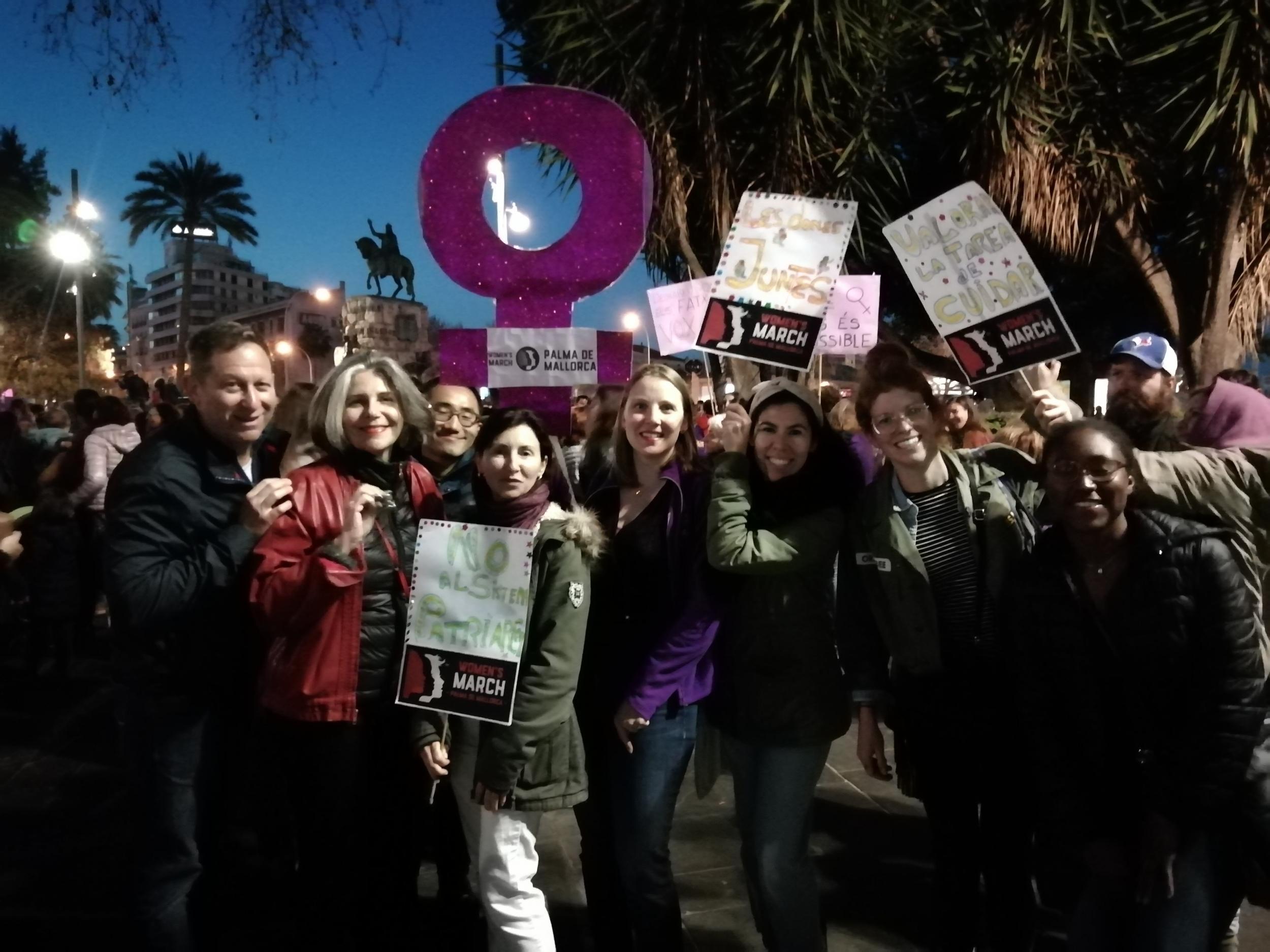
Women’s March protesters in Geneva
The campaigner said they are planning a “Meet Greet Eat” which will see them produce a short video and livestream other marches – with around 30 people expected to attend.
Social media movements such as #metoo or #yotambien in Spain have served as a “catalyst to start and maintain” conversations around sexual violence and harassment, she added.
---30---

No comments:
Post a Comment